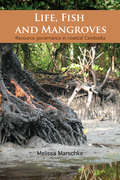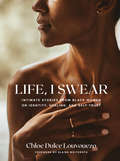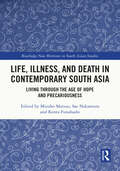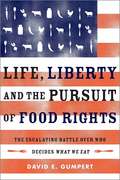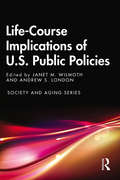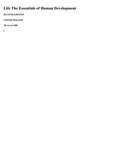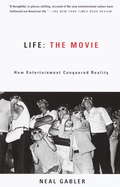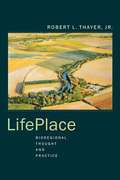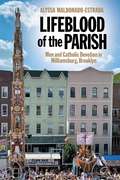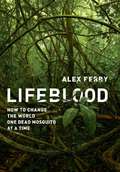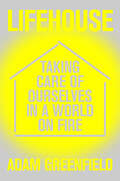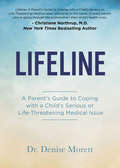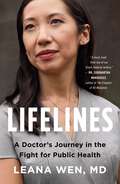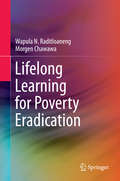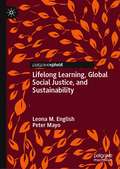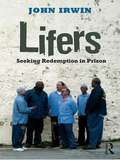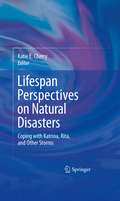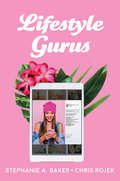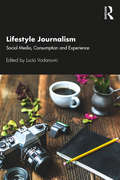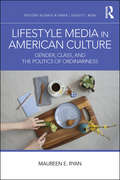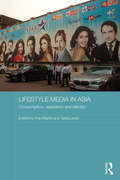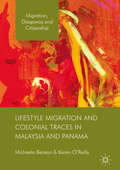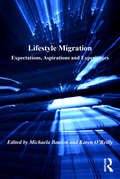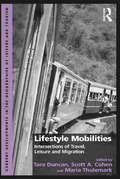- Table View
- List View
Life, Fish and Mangroves: Resource Governance in Coastal Cambodia (Governance Series)
by Melissa MarschkeIn Life, Fish and Mangroves, Melissa Marschke explores the potential of resource governance, offering a case study of resource-dependent village life. Following six households and one village-based institution in coastal Cambodia over a twelve-year period, Marschke reveals the opportunities and constraints facing villagers and illustrates why local resource management practices remain delicate, even with a sustained effort. She highlights how government and business interests in community-based management and resource exploitation combine to produce a complex, highly uncertain dynamic. With this instructive study, she demonstrates that in spite of a significant effort, spanning many years and engaging many players, resource governance remains fragile and coastal livelihoods in Cambodia remain precarious.
Life, I Swear: Intimate Stories from Black Women on Identity, Healing, and Self-Trust
by Chloe Dulce LouvouezoForeword by Elaine WelterothIn this stunningly illustrated essay collection inspired by the popular podcast Life, I Swear, prominent Black women reflect on self-love and healing, sharing stories of the trials and tribulations they’ve faced and what has helped them confront pain, heal wounds, and find connection. With essays by Eniafebiafe Isis Adewale • Lauren Ash • Gabrielle Williams • Lindsey Farrar • Nneke Julia • Elaine Welteroth • Meryanne Loum-Martin • Lili Lopez • Deun Ivory • Morgan Ashley • Dydine Umunyana • Adriana Parrish • Orixa Jones • Offeibea Obubah • Alex Elle • Kalkidan Gebreyohannes • Esther Boykin • Brooke Hall • Qimmah Saafir • Josefina H. Sanders • Julee Wilson • Shay Jiles • Danasia FantasticA mixture of poignant essays, gorgeous photography, and sophisticated design elements, Life, I Swear is a chronicle of transformation and growth by and for modern-day Black women. Some of today’s most influential Black female voices chronicle their private journeys, offering testimonies of living through pain and joy with raw honesty and unapologetic self-love.In each episode of her podcast, Life, I Swear, emotive storyteller Chloe Dulce Louvouezo explores the nuances of our diverse experiences. In one-on-one interviews and personal prose, the podcast centers on personal stories that offer universal insights into topics relevant to modern women’s lives, from identity and family to trauma and motherhood, told through the lens of Black women. A catalyst for change, this revelatory book builds on the premise of the podcast by diving deeper into themes of mental health, identity and resilience. Life, I Swear is sure to spark lively, thought-provoking, and necessary conversations that encourage Black women to return home to themselves through self-examination and grace. Life, I Swear features 100-125 full-color photographs throughout.
Life, Illness, and Death in Contemporary South Asia: Living through the Age of Hope and Precariousness (Routledge New Horizons in South Asian Studies)
by Mizuho Matsuo Sae Nakamura Kenta FunahashiThis book explores the experiential and affective dimensions of structural transformation in South Asia through contemporary and historical accounts of life, ageing, illness, and death. The contributions to this book include analyses from various regions in South Asia, and topics discussed uncover how people’s experiences of life, ageing, illness, and death are entangled with the technology of governance, biomedicine, neoliberal restructuring and other national/international policies. Structured in three parts – governance, technology, and citizenship; well-being and restructuring of the social; waiting, hesitation, and hope as attitudes in facing the precariousness and fundamental uncertainty of life – the book brings to light the ways in which people face and continue to engage with their own and others’ lives cautiously, waveringly, but with a sense of hope. A novel contribution to the study of how people struggle or navigate their lives through the conditions of inequity and precariousness in South Asia, this book will be of interest to researchers studying anthropology, sociology, history, medical and development studies of South Asia, as well as to those interested in cultural and social theory.
Life, Liberty and the Pursuit of Food Rights
by David E. GumpertDo Americans have the right to privately obtain the foods of our choice from farmers, neighbors, and local producers, in the same way our grandparents and great grandparents used to do? Yes, say a growing number of people increasingly afraid that the mass-produced food sold at supermarkets is excessively processed, tainted with antibiotic residues and hormones, and lacking in important nutrients. These people, a million or more, are seeking foods outside the regulatory system, like raw milk, custom-slaughtered beef, and pastured eggs from chickens raised without soy, purchased directly from private membership-only food clubs that contract with Amish and other farmers. Public-health and agriculture regulators, however, say no: Americans have no inherent right to eat what they want. In today's ever-more-dangerous food-safety environment, they argue, all food, no matter the source, must be closely regulated, and even barred, if it fails to meet certain standards. These regulators, headed up by the U. S. Food and Drug Administration, with help from state agriculture departments, police, and district-attorney detectives, are mounting intense and sophisticated investigative campaigns against farms and food clubs supplying privately exchanged food-even handcuffing and hauling off to jail, under threat of lengthy prison terms, those deemed in violation of food laws. Life, Liberty, and the Pursuit of Food Rights takes readers on a disturbing cross-country journey from Maine to California through a netherworld of Amish farmers paying big fees to questionable advisers to avoid the quagmire of America's legal system, secret food police lurking in vans at farmers markets, cultish activists preaching the benefits of pathogens, U. S. Justice Department lawyers clashing with local sheriffs, small Maine towns passing ordinances to ban regulation, and suburban moms worried enough about the dangers of supermarket food that they'll risk fines and jail to feed their children unprocessed, and unregulated, foods of their choosing. Out of the intensity of this unprecedented crackdown, and the creative and spirited opposition that is rising to meet it, a new rallying cry for food rights is emerging.
Life-Course Implications of US Public Policy (Society and Aging Series)
by Janet M. WilmothThere is a complex set of public policies and associated programs that constitute the social safety net in the United States. In Life-Course Implications of U.S. Public Policies, the authors encourage others to systematically consider the influence of policies and programs on lives, aging, and the life course, and how the consequences might vary by gender, race/ethnicity, sexual orientation, ability, and social class. The volume aims to foster an appreciation of how policy influences connect and condition the life course. Chapters examine issues relating to health, housing, food security, crime, employment, and care work, amongst other issues, and demonstrate how the principles of the life-course perspective and cumulative inequality theory can be used to inform contemporary public policy debates. Life-Course Implications of U.S. Public Policies will be a great resource for students of gerontology, sociology, demography, social work, public health and public policy, as well as policy makers, researchers in think tanks, and advocates, who are concerned with age-based policy.
Life: An Enigma, a Precious Jewel
by Daisaku IkedaThe Cosmos and Life, The Buddhist View of Life, Life and Death.
Life: The Essentials of Human Development
by Gabriela MartorellLife: The Essentials of Human Development is designed to be a brief but thorough account of human development from conception to death, exposing students to culture and diversity, and immersing them in practical application.
Life: The Movie
by Neal Gabler"A thoughtful, in places chilling, account of the way entertainment values have hollowed out American life." --The New York Times Book ReviewFrom one of America's most original cultural critics and the author of Winchell, the story of how our bottomless appetite for novelty, gossip, glamour, and melodrama has turned everything of importance-from news and politics to religion and high culture-into one vast public entertainment.Neal Gabler calls them "lifies," those blockbusters written in the medium of life that dominate the media and the national conversation for weeks, months, even years: the death of Princess Diana, the trial of O.J. Simpson, Kenneth Starr vs. William Jefferson Clinton. Real Life as Entertainment is hardly a new phenomenon, but the movies, and now the new information technologies, have so accelerated it that it is now the reigning popular art form. How this came to pass, and just what it means for our culture and our personal lives, is the subject of this witty, concerned, and sometimes eye-opening book.From the Trade Paperback edition.
LifePlace: Bioregional Thought and Practice
by Robert L. Thayer Jr.This is a passionately written advocacy of bioregionalism, the conviction that people should live, work, play, and consume locally, for the health of the environment and for society. The book is inspirational as well as educational, a combination of philosophy and practical suggestions for implementing bioregionalism in communities.
Lifeblood of the Parish: Men and Catholic Devotion in Williamsburg, Brooklyn (North American Religions #4)
by Alyssa Maldonado-EstradaA New York City ethnography that explores men's unique approaches to Catholic devotionEvery Saturday, and sometimes on weekday evenings, a group of men in old clothes can be found in the basement of the Shrine Church of Our Lady of Mount Carmel in Williamsburg, Brooklyn. Each year the parish hosts the Feast of Our Lady of Mount Carmel and San Paolino di Nola. Its crowning event is the Dance of the Giglio, where the men lift a seventy-foot tall, four-ton tower through the streets, bearing its weight on their shoulders.Drawing on six years of research, Alyssa Maldonado-Estrada reveals the making of this Italian American tower, as the men work year-round to prepare for the Feast. She argues that by paying attention to this behind-the-scenes activity, largely overlooked devotional practices shed new light on how men embody and enact their religiosity in sometimes unexpected ways.Lifeblood of the Parish evocatively and accessibly presents the sensory and material world of Catholicism in Brooklyn, where religion is raucous and playful. Maldonado-Estrada here offers a new lens through which to understand men’s religious practice, showing how men and boys become socialized into their tradition and express devotion through unexpected acts like painting, woodworking, fundraising, and sporting tattoos. These practices, though not usually considered religious, are central to the ways the men she studied embodied their Catholic identity and formed bonds to the church.
Lifeblood: How to Change the World One Dead Mosquito at a Time
by Alex PerryIn 2006, the Wall Street pioneer and philanthropist Ray Chambers flicked through some holiday snapshots taken by his friend, development economist Jeff Sachs, and remarked on the placid beauty of a group of sleeping Malawian children. ?TheyOCOre not sleeping, OCO Sachs told him. ?TheyOCOre in malarial comas. A few days later, they were all dead. OCO Chambers had long avoided the public eye, but this moment sparked his determination to coordinate an unprecedented, worldwide effort to eradicate a disease that has haunted humanity since before the advent of medicine. Award-winning journalist Alex Perry obtained unique access to Chambers, now the UN Special Envoy for Malaria. In this book, Perry weaves together science and history with on-the-ground reporting and a riveting expos(r) of the workings of humanitarian aid to document ChambersOCO campaign. By replacing traditional ideas of assistance with business acumen and hustle, Chambers saved millions of lives, and upturned current notions of aid, forging a new path not just for the developing world but for global business and philanthropy.
Lifehouse: Taking Care of Ourselves in a World on Fire
by Adam GreenfieldA manifesto and guide for building mutual aid groups and reclaiming power in a time of perpetual crisisWe are living through a Long Emergency: a near-continuous train of pandemics, heatwaves, droughts, resource wars and other climate-driven disasters. In Lifehouse, Adam Greenfield asks what might happen if the tactics and networks of care that spring up in response to these times might be brought together in a single, coherent way of life?Using examples from the Black Panthers&’ &“survival programs,&” the astonishingly effective Occupy Sandy disaster-relief effort and the neighborhood-based mutual aid groups that sustained many during COVID lockdowns to the large-scale, self-organised polities of municipalist Spain and Kurdish Rojava, Greenfield argues for rethinking local power as a bulwark against despair — a way to discover and develop the individual and collective capacities that have gone underutilized during all the long years of late capitalism, and a means for thriving in the face of impending catastrophe.
Lifeline: A Parent’s Guide to Coping with a Child’s Serious or Life-Threatening Medical Issue
by Dr. Denise MorettIn Lifeline, Dr. Denise Morett provides validation and support along with tools and strategies on how to cope with a child’s life threatening illness. Denise Morett, Psy. D., is a psychologist with over 25 years of experience treating individuals and families, including those with a family member facing serious or life-threatening medical issues. Dr. Morett found herself in those exact circumstances when her son was diagnosed with a very rare, life-threatening illness. Driven by her own search for supportive re-sources, Dr. Morett provides ways to cope with one of the most challenging circumstances a parent can encounter.
Lifelines: A Doctor's Journey in the Fight for Public Health
by Dr. Leana WenFrom medical expert Leana Wen, MD, Lifelines is an insider's account of public health and its crucial role—from opioid addiction to global pandemic—and an inspiring story of her journey from struggling immigrant to being one of Time’s 100 Most Influential People.“Public health saved your life today—you just don’t know it,” is a phrase that Dr. Leana Wen likes to use. You don’t know it because good public health is invisible. It becomes visible only in its absence, when it is underfunded and ignored, a bitter truth laid bare as never before by the devastation of COVID-19.Leana Wen—emergency physician, former Baltimore health commissioner, CNN medical analyst, and Washington Post contributing columnist—has lived on the front lines of public health, leading the fight against the opioid epidemic, outbreaks of infectious disease, maternal and infant mortality, and COVID-19 disinformation. Here, in gripping detail, Wen lays bare the lifesaving work of public health and its innovative approach to social ills, treating gun violence as a contagious disease, for example, and racism as a threat to health.Wen also tells her own uniquely American story: an immigrant from China, she and her family received food stamps and were at times homeless despite her parents working multiple jobs. That child went on to attend college at thirteen, become a Rhodes scholar, and turn to public health as the way to make a difference in the country that had offered her such possibilities.Ultimately, she insists, it is public health that ensures citizens are not robbed of decades of life, and that where children live does not determine whether they live.
Lifelong Learning for Poverty Eradication
by Wapula N. Raditloaneng Morgen ChawawaThis book illustrates the meaning and scope of lifelong learning and different types of poverty reduction programs prevalent generally in the African context and particularly in selected communities in Botswana. Lifelong learning is important for all stakeholders in poverty reduction to develop a better understanding of the scope and extent of poverty so that they can make informed decisions on best ways of tackling poverty. The book succinctly showcases community development and engagement initiatives and experiences from selected African universities and how the interaction of the universities and their respective communities resulted in a major transformation in the lives of poor families through exposure to some engagement strategies that effectively gave them a better future in their fight against poverty. This book develops in the reader a better understanding of the dynamics and dilemma of poverty and its negative effects on individuals and communities. But it answers the plight of the poor by equipping them with effective and practical tools to transform their lives and take full control of their destiny. · Provides a conceptual understanding of lifelong learning · Describes practical aspects and indicators of poverty and how it requires tackling through a multi-sectoral approach · Focuses on poverty reduction in all fronts, including development of an entrepreneurship mind-set
Lifelong Learning, Global Social Justice, and Sustainability
by Peter Mayo Leona M. EnglishThis book examines lifelong learning from different angles and follows the trajectory beginning with the expansive notion of lifelong education promoted by the United Nations Educational, Scientific, and Cultural Organization (UNESCO) and its subsequent version intended to better suit the neoliberal framework and make EU countries more competitive in the global economy. The authors critique this version of lifelong learning by contrasting it with the notion of critical literacy. They also devote attention to the UN’s advocacy concerning lifelong education and sustainable development, arguing that for lifelong learning to help realize this goal, it needs to become more holistic in scope and engage more globally conceived social and human-earth relations. The book concludes with a discussion on lifelong learning and the COVID-19 pandemic.
Lifers: Seeking Redemption in Prison
by John IrwinJohn Irwin writes about prisons from an unusual academic perspective. Before receiving a Ph.D. in sociology, he served five years in a California state penitentiary for armed robbery. This is his sixth book on imprisonment – an ethnography of prisoners who have served more than twenty years in a California correctional institution. The purpose of the book is to take issue with the conventional wisdom on homicide, society’s purposes of imprisonment, and offenders’ reformability. Through the lifers’ stories, he reveals what happens to prisoners serving very long sentences in correctional facilities and what this should tell us about effective sentencing policy.
Lifespan Perspectives on Natural Disasters
by Katie E. CherrySome of our most disturbing images of Hurricane Katrina involve the very old, trapped in flooded nursing homes, and the very young, sick in toxic trailers. Using the Katrina-Rita nexus as its reference point, Lifespan Perspectives on Natural Disasters takes the developmental long view on human strengths and vulnerabilities during large-scale devastation and crisis. An expert panel of behavioral scientists and first responders analyzes the psychological impact of natural disasters on--and coping faculties associated with--children, adolescents, and young, middle-aged, older, young-old and late-life oldest-old adults. This timely information is invaluable both to mental health service providers and to those tasked with developing age-appropriate disaster preparedness, intervention, and recovery programs. In addition, the book references other deadly storms as well as other major catastrophic events (e.g., the September 11 attacks, the Indian Ocean Tsunami), and includes such topics as: Young children's understanding of hurricanes. Positive adjustment in youth after Katrina. How families make meaning out of disaster. Disaster recovery in the workplace. Recovery services for the frail elderly. Coping and health in late life. Preparation and training mental health personnel for disasters. Unique in the disaster literature, Lifespan Perspectives on Natural Disasters serves as a research reference and idea book for professionals and graduate-level students in psychology, social work, and disaster preparedness and services.
Lifestyle Gurus: Constructing Authority and Influence Online
by Chris Rojek Stephanie A. BakerThe rise of blogs and social media provide a public platform for people to share information online. This trend has facilitated an industry of self-appointed ‘lifestyle gurus’ who have become instrumental in the management of intimacy and social relations. Advice on health, wealth creation, relationships and well-being is rising to challenge the authority of experts and professionals. Pitched as ‘authentic’, ‘accessible’ and ‘outside of the system’, this information has produced an unprecedented sense of empowerment and sharing. However, new problems have arisen in its wake. In Lifestyle Gurus, Baker and Rojek explore how authority and influence are achieved online. They trace the rise of lifestyle influencers in the digital age, relating this development to the erosion of trust in the expert-professional power bloc. The moral contradictions of lifestyle websites are richly explored, demonstrating how these technologies encourage a preoccupation with the very commercial and corporate hierarchies they seek to challenge. A timely account of how lifestyle issues are being packaged and transacted in a wired-up world, this book is important reading for students and scholars of media, communication, sociology and related disciplines.
Lifestyle Journalism: Social Media, Consumption and Experience
by Lucia VodanovicRanging from travel to wellbeing and fashion to food, Lifestyle Journalism explores a wide variety of subjects within a growing field. This edited collection examines the complex dynamics of the ever-evolving media environment of lifestyle journalism, encompassing aspects of consumerism, entertainment and cosmopolitanism, as well as traditional journalistic practices. Through detailed case studies and research, the book discusses themes of consumer culture, identity, representation, the sharing economy and branding while bringing in important new aspects such as social media and new cultural intermediaries. International and cross-disciplinary, the book is divided into four parts: emerging roles; experience and identity in lifestyle media; new players and lifestyle actors; and lifestyle consumerism and brands. Featuring case studies from a variety of countries including Turkey, the US, Chile and the UK, this is an important resource for journalism students and academics.
Lifestyle Media in American Culture: Gender, Class, and the Politics of Ordinariness (Routledge Research in Gender, Sexuality, and Media)
by Maureen E. RyanThis book explores the emergence of "lifestyle" in the US, first as a term that has become an organizing principle for the self and for the structure of everyday life, and later as a pervasive form of media that encompasses a variety of domestic and self-improvement genres, from newspaper columns to design blogs. Drawing on the methodologies of cultural studies and feminist media studies, and built upon a series of case studies from newspapers, books, television programs, and blogs, it tracks the emergence of lifestyle’s discursive formation and shows its relevance in contemporary media culture. It is, in the broadest sense, about the role played by the explosion of lifestyle media texts in changing conceptualizations of selfhood and domestic life.
Lifestyle Media in Asia: Consumption, Aspiration and Identity (Media, Culture and Social Change in Asia)
by Fran Martin Tania LewisAcross Asia, consumer culture is increasingly shaping everyday life, with neoliberal economic and social policies increasingly adopted by governments who see their citizens as individualised, sovereign consumers with choices about their lifestyles and identities. One aspect of this development has been the emergence of new wealthy middle classes with lifestyle aspirations shaped by national, regional and global media – especially by a range of new popular lifestyle media, which includes magazines, television and mobile and social media. This book explores how far everyday conceptions and experiences of identity are being transformed by media cultures across the region. It considers a range of different media in different Asian contexts, contrasting how the shaping of lifestyles in Asia differs from similar processes in Western countries, and assessing how the new lifestyle media represents not just a new emergent media culture, but also illustrates wider cultural and social changes in the Asian region.
Lifestyle Migration and Colonial Traces in Malaysia and Panama (Migration, Diasporas and Citizenship)
by Michaela Benson Karen O’ReillyLeading scholars in the sociology of migration, Michaela Benson and Karen O’Reilly, re-theorise lifestyle migration through a sustained focus on postcolonialism at its intersections with neoliberalism. This book provides an in-depth analysis of the interplay of colonial traces and neoliberal presents, the relationship between residential tourism and economic development, and the governance and regulation of lifestyle migration. Drawing on ethnographic fieldwork undertaken by the authors among lifestyle migrants in Malaysia and Panama, they reveal the structural and material conditions that support migration and how these are embodied by migrant subjects, while also highlighting their agency within this process. This rigorous work marks an important contribution to emerging debates surrounding privileged migration and mobility. It will appeal to sociologists, social theorists, human and cultural geographers, economists, social psychologists, demographers, social anthropologists, tourism and migration studies specialists.
Lifestyle Migration: Expectations, Aspirations and Experiences (Studies in Migration and Diaspora)
by Michaela BensonRelatively affluent individuals from various corners of the globe are increasingly choosing to migrate, spurred on by the promise of a better and more fulfilling way of life within their destination. Despite its increasing scale, migration academics have yet to consolidate and establish lifestyle migration as a subfield of theoretical enquiry, until now. This volume offers a dynamic and holistic analysis of contemporary lifestyle migrations, exploring the expectations and aspirations which inform and drive migration alongside the realities of life within the destination. It also recognizes the structural conditions (and constraints) which frame lifestyle migration, laying the groundwork for further intellectual enquiry. Through rich empirical case studies this volume addresses this important and increasingly common form of migration in a manner that will interest scholars of mobility, migration, lifestyle and culture across the social sciences.
Lifestyle Mobilities: Intersections of Travel, Leisure and Migration (Current Developments in the Geographies of Leisure and Tourism)
by Tara Duncan, Scott A. Cohen and Maria ThulemarkBeing mobile in today's world is influenced by many aspects including transnational ties, increased ease of access to transport, growing accessibility to technology, knowledge and information and changing socio-cultural outlooks and values. These factors can all engender a (re)formation of our everyday life and moving - as and for lifestyle - has, in many ways, become both easier and much more complex. This book highlights the crossroads between concepts of lifestyle and the growing body of work on 'mobilities'. The study of lifestyle offers a lens through which to study the kinds of moorings, dwellings, repetitions and routines around which mobilities become socially, culturally and politically meaningful. Bringing together scholars from geography, sociology, tourism, history and beyond, the authors illustrate the breadth and richness of mobilities research through the concept of lifestyle. Organised into four sections, the book begins by dealing with aspects of bodily performance through lifestyle mobility. Section two then looks at how we can use mobile methods within social research, whilst section three explores issues surrounding ideas of mobility, immobility and belonging. Finally, section four draws together a number of chapters that focus on the complexities of identity within mobility. Often drawing on ethnographic research, contributors all share one common feature: they are at the forefront of research into lifestyle mobilities.
